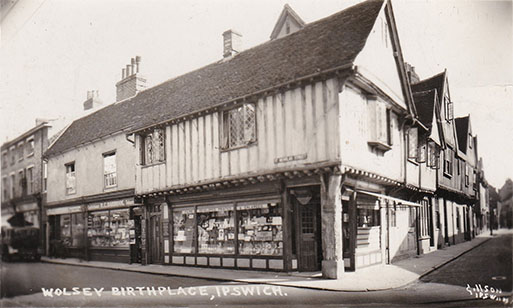- Screen Colours:
- Normal
- Black & Yellow
(from our last issue…)
 After the closure of his shop in St Peters Street, I think Douglas Barbrook – my grandfather’s brother’s son – with his radio construction talents, moved to Colchester. The only written details I have of his later exploits were from an article and picture in the Evening Star of a robot (a peak-capped, white-coated ‘man’) which he had designed and built, and fitted with some proximity sensing device of his, it saluted motorists as they drove into the petrol filling station just outside Colchester on the main London Road.
After the closure of his shop in St Peters Street, I think Douglas Barbrook – my grandfather’s brother’s son – with his radio construction talents, moved to Colchester. The only written details I have of his later exploits were from an article and picture in the Evening Star of a robot (a peak-capped, white-coated ‘man’) which he had designed and built, and fitted with some proximity sensing device of his, it saluted motorists as they drove into the petrol filling station just outside Colchester on the main London Road.
I believe that my grandfather originally trained as an electrician with Cranfield’s flour millers. When work was short in the 1920s he had to take on loading lorries with sacks of flour or grain. At that time I think they weighed 2 cwt. (one-tenth of a ton) and, with him being a slightly-built man, it did him great harm. I think he had to leave owing to his failing health, but soon acquired 45 and 45a St Nicholas Street. After him, in around 1947, it became the Cardinal Café. Those two shop sections are now, of course, re-united with Curson Lodge following its extensive renovation by the Ipswich Building Preservation Trust.
I can tell a very personal and amusing tale about that which occurred at the time the Mayor was declaring Curson Lodge ‘reopen’. I turned up on the wrong day for public viewing, but almost became ‘star of the show’ when I blundered in on the ceremony, clutching my photographs.
Grandfather too seemed to be ‘ahead of his time’ as, even before World War I, he owned a Clyno motorcycle combination and then in 1930 a Clyno car with which he also towed a boat trailer. Sailing around the bay at Felixstowe then was a very smart thing to do, especially as his family could round off their day with afternoon tea at his hut which he had built and positioned in Beach Station Road – one of the first on that site.
That all came to an end in 1939. I think the boat went first, then the car, and then he simply dis-assembled his hut and brought it home on the train a few boards at a time for the duration of the war and concentrated on his shop. But in around 1947, once the Felixstowe sea-front was reopened, he gave up his shop and took his dis-assembled hut back to Beach Station Road and rebuilt it. There it remained until the whole site was cleared for a building development quite recently.
John Barbrook